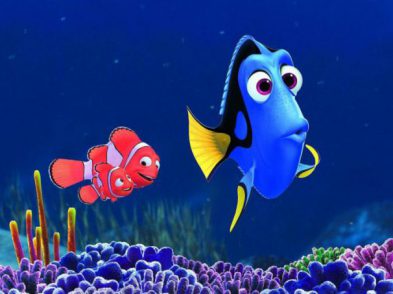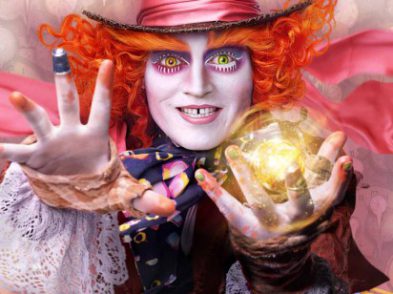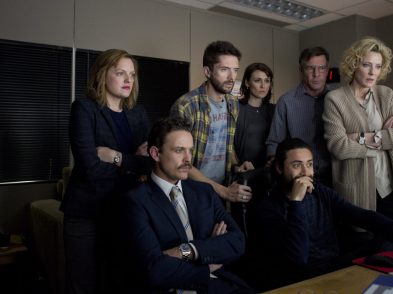The Odeon
NOAH ««««
May 12–14
‘The end of the world… is just the beginning. Rediscover the epic story of one man and the most remarkable event in our history.’ The biblical story of the Great Flood and the animals and the Ark. ‘Darren Aronofsky brings wild ambition and thrilling artistry to one of the Old Testament’s best-known, most dramatic, least plausible stories—Noah and the ark—with Russell Crowe infusing the role of God’s first seaman and zookeeper with all his surly majesty’ (Time). ‘Aronofsky’s sixth film is not the Noah you know, but a hundred-million-dollar Chinese whisper; a familiar story made newly poetic and strange with a flavour that’s less Genesis than Revelation’ (The Telegraph). ‘Noah is here not to set the record straight, but to set it on its head. This isn’t a lavish work of mad genius, it’s a movie designed to be a lavish work of mad genius, and there’s a difference’ (Village Voice). ‘Often ludicrous, occasionally thoughtful’ (New York Daily News).
THE ROYAL TENENBAUMS «««
May 13
The high-flying Tenenbaum siblings reunite for some bad news and soul-searching. Wes Anderson’s absurdist comedy-drama released to mixed reviews in the aftermath of 9/11 is, as is usually the case with this director’s hit-and-miss quirkiness, polarising: it turns some on and it turns some off. ‘Sweet and funny, doggedly oddball if bordering precious’ (Village Voice). ‘Underachieves in its own way by trapping an expansive, probing story in a brittle, highly artificial style that constricts character and emotional development’ (Variety). ‘There are laughs in it. But mostly you sit around waiting for it to be funnier, or at least funny more often. The problem is that it hasn’t figured out a way to be funny while satisfyingly accommodating the pain in these characters’ (Boston Globe). ‘Condescending and self-infatuated; at least three times too clever for its own good’ (Wall Street Journal).
GRACE OF MONACO««
May 15–21
Set in 1962, six years after her celebrated wedding, Grace of Monaco is an intimate snapshot of a year in the life of the iconic Hollywood star turned princess. She struggles to cope with her newfound role as mother, monarch of a European principality and wife to Prince Rainier III, whose run-in with President De Gaulle of France doesn’t help matters. The stuff of soap opera, aggravated by Nicole Kidman’s weird accent and chemically enhanced facial aesthetics, not mention the fatal miscasting of Tim Roth as the prince. A rather demeaning and transparently vulgar attempt to cash in on second-hand celebrity with little or nothing to contribute to the Grace Kelly legend—or Monegasque politics for that matter.
The British Institute
TO HAVE AND HAVE NOT (1944)««««
May 14, 8pm
Famed for the exquisite chemistry between craggy, old-hand Bogart and dazzling screen novice, 19-year-old Lauren Bacall (resulting, off-screen, in their enduring marriage), Howard Hawks’ rather loose adaptation of Ernest Hemingway’s story is a (pleasing) rehash of Casablanca. In wartime Martinique, an important underground leader must be smuggled out of Vichy hands to freedom in America. Bogart is on top form as Harry Morgan, whose sticking-his-neck-out-for-nobody stance is softened by Bacall’s seductive eloquence: ‘You don’t have to say anything … just whistle. You know how to whistle, don’t you Steve? You just put your lips together and blow,’ written, incidentally, not by Hemingway nor by screenwriter William Faulkner, but by Hawks. And there’s also the shimmy…
THE BIG SLEEP (1946)«««««
May 21, 8pm
With a plot so convoluted the screenwriters and even the original author Raymond Chandler were baffled, The Big Sleep is really a star vehicle for the Bogart-Bacall partnership, where such things don’t matter. In a stylish noir, quintessential Bogart character private eye Philip Marlowe attempts to track down the blackmailer of an errant daughter overprotected by her sister, etc., etc. [insert your version here]. ‘The Big Sleep is a violent, smoky cocktail shaken together from most of the printable misdemeanors and some that aren’t—one of those Raymond Chandler specials which puts you, along with the cast, into a state of semi-amnesia through which tough action and reaction drum with something of the nonsensical solace of hard rain on a tin roof. Humphrey Bogart and several proficient minor players keep anchoring it to some sufficient kind of reality’ (James Agee). ‘[F]ilm contains the sharpest, toughest, wittiest, sexiest dialogue ever written for detective film … Hawks perfectly conveys Chandler’s corrosive yet enticing Los Angeles’ (Danny Peary).
THE TREASURE OF THE SIERRA MADRE (1948) «««««
May 28, 8pm
John Huston directs Bogart as down-and-out Fred C. Dobbs, drifter turned gold prospector in this exploration of greed and mistrust in the Mexican hills. Many consider this to be Bogart’s best performance, not least because he gets to dispense with his clean-cut, urbane and cynical persona developed in the noir detective classics. This grubby character goes from affable nobody to murderous paranoid fiend. (Bogart told New York Post critic Archer Winston, ‘Wait till you see me in my next picture, I play the worst shit you ever saw!’) ‘Huston has shaped a searching drama of the collision of civilization’s vicious greed with the instinct for self-preservation in an environment where all the barriers are down’ (New York Times). ‘When it’s over you know you’ve seen something’ (Pauline Kael).







